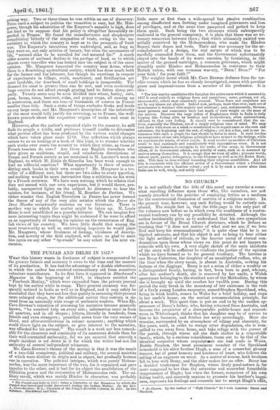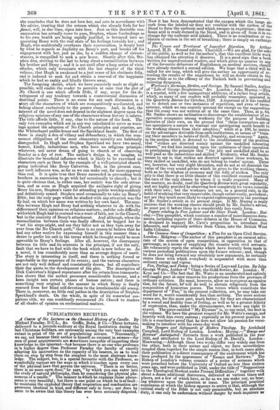NO CHURCH.*
IT is not unlikely that the title of this novel may exercise a some-. what repelling influence upon those vlio, like ourselves, are not warmly attached to the practice of employing fiction as a medium for the controversial discussion of matters of a religious nature. In the present case, however, any such feeling would he entirely. mis- placed- The simple fact is, that the title-page is the only part of the volumes now before us in which even the semblance of a contro- versial tendency can by any possibility be detected. Although the author incidentally gives us to understand that his own sympathies are in favour of the Broad Church doctrines, which he defines as teaching that " it does not matter of what sect we are, if we love God and keep his commandments," it is quite clear that he is no bigoted advocate, and that his object is not to bring to bear either the light artillery of ridicule, or the heavier metal of eternal con- demnation upon those whose views on this point do not happen to coincide with his own. A very slight sketch of the main incidents of the story will be sufficient to vindicate the justice of the opinion which we have formed as to its general tendency. The heroine is one Bessy Calverton, the daughter of an unmitigated ruffian, who, at. the time when the story opens, is absent in Australia, seeking his fortune at the diggings. Bessy is not a scion of dither a wealthy or a distinguished family, having, in fact, been born in gaol, whence, after her mother's death, she is removed by her uncle, a Welsh quarryman belonging to the straitest sect of the Methodists, by whom she is brought up until she reaches her twelfth year. During this period the only break in the monotony of her existence is the visit of a lively young London carpenter, named Stephen Speckland, who, being in. weak health, comes to Wales for a brief holiday, and stays in her uncle's house, on the mutual accommodation principle, for about a week. This quiet time is put an end to by the sudden ap- pearance of Bessy's father, who, having returned from Australia, and become the proprietor of a disreputable publie-house and concert- room in Whitechapel, thinks that his daughter may he of service to him in his business, and fetches her away accordingly. Here she remains, surrounded by an atmosphere of villany and obscenity, for five years, until, in order to escape utter degradation, she is com- pelled to run away from home, and take refuge with the parson of the parish, through whose aid she finds shelter in a respectable family, which, by a curious coincidence, turns out to be that of the identical carpenter whose acquaintance she had, made in Wales.. Beside Stephen, the most prominent member of the Speckland household is his elder brother Hugh, a man of a somewhat gloomy temper, but of great honesty and kindness of heart, who follows the calling of an engraver on wood. As a matter of course, both brothers. fall in love with Bessy, and the elder makes her an offer. Bessy has. a decided tenderness for Stephen, whose lively good-nature is far more congenial to her than the saturnine and somewhat formidable temperament of Hugh ; but when the former, conscious of his own failing health, and sincerely anxious to. promote . his, brother's happi- ness, represses his feelings and counsels her to accept Hugh's offer, • No Church. By the Author of " High Church.' In. 8 vols. London: Hurst and Blacken. /and, will, in due time, ripen into love. Just as this desirable con- change for the carbonic acid inhaled. There is no combustion or ox- to his own health are being rapidly justified, is betrayed into ac- idatiou of carbon in the act of breathing; there is simply an exchange quainting Bessy with the real state of his feelings towards her ; and of gases. Hugh, who accidentally overhears their conversation, is deeply hurt The Causes and 'Treatment of Imperfect Digestion. By Arthur by. what he regards as duplicity on Bessy's part, and breaks off his Leared, M.D. Second edition. Churchill.—We are glad, for the sake engagement with her, just as she, by a sudden change of circum- of the public, as well as for the author's, that this excellent little work stances, is compelled to seek a new home. Shortly after this, Ste- has obtained the attention it deserves. It is a good sign that a book phen dies, striving to the last to bring about a reconciliation between written for unprofessional readers and on medical matters, should his brother and Bessy ; and it is not until after a long series of vicis- of the favourite delusions of Engl
situdes, which only terminate with the last chapter of the third have already reached a second edition. We hope that a third wi volume, that Hugh is awakened to a just sense of his obstinate folly, will called for ere long, which wi give the author an opportunity of re- and is induced to seek for and obtain a renewal of the happiness mean while as to the efficacy of the Turkish bath in preventing and which he had so rashly and blindly thrown away. relieving dyspepsia.
The foregoing sketch, which we have purposely made as slight as Workmen's EarniT,Strikes, and Savings. By Samuel Smiles, Author possible, will enable the reader to perceive at once that the plot of of "Life of George Stephenson," &c. London : John Murray.—This No Church is one which affords little, if any, scope for the de- is a reprint, with a few unimportant additions, of a rather long article, velopment of any tendency towards a controversial discussion of which, as many of our readers will probably remember, appeared in doctrinal points. There is no room for any such discussion in a the Quarterly Review for October, 1859. A reperusal of it has enabled story all the characters of which are comparatively uneducated, and us to detect one or two instances of repetition, and even of incon- sistency, which we can scarcely account for except on the supposition belong almost exclusively to the poorer classes. And, in fact, the
interest of the novel does not depend in the slightest degree upon the religious opinions of any one of the characters whose history it relates.
Sunday as a day of rest. The author's design is, we imagine, to illustrate the beneficial influence which is likely to be exercised on of Mr. Smiles's article in its present shape. If Mr. Murray is really fly-leaf, on which her name was written by her own hand. The sepa- tion between Hugh and Bessy had nothing whatever to do with the
he must put it before them in a considerably less costly form. differenceof their opinions on religious matters ; and the sole difficulty Papers relating to Free Labour and the Slave Thale. London: Bar- withwhich Hugh had to contend was a want of faith, not in the Church, clay—This pamphlet, which contains a number of miscellaneous docu- but in the sincerity of Bessy's attachment. And although, when the meats, including reports of three debates in the House of Commons, reconciliation between them was finally effected, he begged her to is designed to support Mr. Cave's proposition to introduce free 4' set his steps aright, and see they falter not as they turn away for labourers, and especially settlers from China, into the British West ever from the No Church path," there is no reason to believe that he India Colonies. had any other motive for expressing himself in this manner than a The Common Sense of Competition: a Plea for an Open Civil Service. desire to prefer his suit in the terms which he thought would be most London : Ridgway.—The author of this pamphlet is an earnest advo- agreeable to Bessy's feelings. After all, however, the discrepancy cate of the system of open competition, in opposition to that of between its title and its contents is the principal, if not the only, patronage, as a means of supplying the country with civil servants. lie vehemently repels the attacks which have recently been made in fault that we have to find with the book which is now before us. As various periodical publications upon the former scheme; and, though a novel, it has considerably more than an average degree of merit, he does not bring forward any absolutely new arguments, he certainly The story is interesting in itself, and there is nothing forced or states those with which everybody is acquainted with more than improbable in the sequence of its events ; and the various characters ordinary energy and vigour.































 Previous page
Previous page